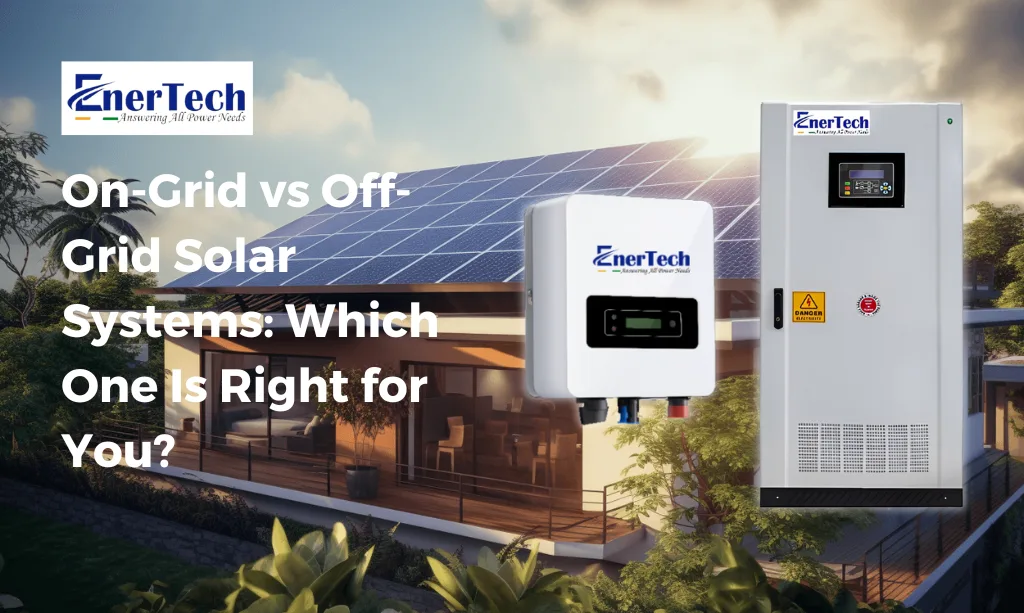So, you’ve decided to switch to solar energy. But what next? It is deciding whether to opt for an on-grid solar system or an off-grid one. That’s precisely where most people get stuck. If you also have come to that stage, this blog is for you. It compares on-grid vs off-grid solar systems to help you make an informed choice.
What is an On-Grid Solar System?
As the name suggests, an on-grid solar system is a grid-tied system connected to the local utility grid. It sends back any excess electricity you produce to the grid. Similarly, during low electricity generation from solar energy, the system allows you to draw electricity from the grid.
What is an Off-Grid Solar System?
On the other hand, an off-grid solar system is independent of the local utility grid. It requires battery storage to store solar energy when the system isn’t producing any electricity or relatively less energy in the night or overcast weather. Let’s now look at some of the key differences between both these system types.
On-Grid vs Off-Grid Solar System – Pros and Cons
Apart from the basic concept, here’s what makes on-grid solar systems different from their off-grid counterparts.
On-Grid Solar System
Pros of On-grid
Here’s what makes on-grid solar systems an advantageous choice.
- Net Metering Benefits: An on-grid system allows you to benefit from net metering. It means you can sell excess energy back to the grid, thus offsetting the cost of electricity you consume from the grid.
- Less Maintenance: Since the system has components, it comes with a nominal maintenance requirement.
- Cost-Effective: On-grid systems are connected to the grid. Hence, they do not require batteries. That makes them a much cheaper option.
Cons of On-grid
However, with some benefits come some cons as well. Here are some of them.
- Grid Dependence: Usually, when there’s a power outage, an on-grid system doesn’t work. It does so only when you pair it with a battery backup.
- Limited Self-Sufficiency: One of the most significant goals of switching to solar energy is becoming energy-independent. But since you are connected to the grid in some way, you won’t be fully independent in terms of energy security.
Off-Grid Solar System
An off-grid solar system also has various advantages associated with it. Some common ones include the following.
Advantages of Off-Grid
- Energy Independence: An off-grid solar system keeps you unaffected by grid outages. Thus, you have complete control over your energy supply.
- Ideal for Remote Areas: Continuous electricity supply is a major concern in many regions in India, particularly the remote ones. Off-grid systems prove useful in such places as they are independent of the grid.
- Sustainable and Self-Sufficient: With an off-grid solar system, you produce your own energy and consume it. It contributes to your endeavors to achieve energy self-sufficiency.
Disadvantages of Off-Grid
Some cons off-grid solar systems include the following.
- Higher Initial Investment: Off-grid systems require batteries and other backup equipment to store energy. This infrastructure can increase the upfront costs.
- Higher Maintenance: The systems comprise various internal components and have batteries that require periodic maintenance and regular upkeep.
- Limited Power Capacity: The system requires you to plan your electricity consumption carefully. Without that, you may face power shortages, particularly during overcast weather or the nighttime.
Learn More: Why Do We Choose a Solar Hybrid Inverter Compared To a Grid-tie inverter and Off-grid inverter?
Which is better, on grid or off-grid?
The answer is in your requirements and prevalent factors. For example, if you need a more economical option, you may choose an on-grid system. However, if you stay in a remote location with frequent power outages or interruptions, you must choose an off-grid system. On the other hand, if your energy needs keep changing, you can go for an on-grid system that lets you utilize electricity from both sources. But if your energy needs are more or less stable, you can go for an off-grid setup.
Request Quote: Off Grid Solar Inverter: Range – 5KVA to 600KVA, Phase – 1 Phase and 3 Phase
Revolutionize Energy Supply with EnerTech’s On-Grid and Off-Grid Solar Energy Systems!
Committed to contributing to energy efficiency, sufficiency, and independence, EnerTech offers a range of on-grid and off-grid solar inverters. These systems are intelligently designed and equipped with numerous features to meet residential and commercial energy needs across the various parts of the country. Explore more about EnerTech’s solar products and write to sales@enertechups.com to connect with the company’s product experts.
Tags: Which is right on grid on off grid in india, difference between on-grid, off-grid and hybrid solar system, On-grid solar system, Off-grid solar system, On-grid and off-grid solar system difference, on-grid, off-grid hybrid solar system, on-grid vs off-grid solar india, on grid vs off-grid, on-grid vs off-grid solar system, off-grid vs on-grid solar system, off-grid vs on-grid




